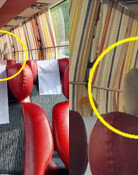With 88.6 Billion Yen Surplus, Japans NHK Should Lower Fees
With 88.6 Billion Yen Surplus, Japans NHK Should Lower Fees
Posted September. 14, 2007 03:08,
The Japanese government is requesting the subsidiaries of the public broadcasting company NHK to transfer a part of their earnings to their mother bodies. Accordingly, NHK is likely to face pressure by management boards or watchers for an additional lowering of fees.
On September 13, the Tokyo Shimbun and other newspapers reported that the Board of Audit of Japan, a constitutionally independent administrative institution, announced that the earned surplus of 34 affiliates, including the subsidiaries of NHK and the public corporation, amounted to 88.6 billion yen (about 700 billion won) as of the end of 2005. Earned surplus refers to the net income reserved internally by enterprises without being divested in the form of dividends or bonus.
In most cases, the purpose of accumulating earned surplus is unclear, explained the Board of Audit of Japan. [Affiliates] ought to contribute to the finances of NHK by special dividends or other means.
Tokyo Shimbun speculated that the comment by the Board of Audit of Japan will have considerable influence on the issue-of-the-day discussion for lowering NHK fees. When the NHK affiliates return the earned surplus to the mother body, it will make room for NHK to lower its fees.
It is also expected that the facts involving parachute appointments (appointments by orders from above) and private contracts by the NHK that were disclosed by the Board of Audit of Japan together with the facts about the earned surplus will bring significant pressure for reform.
The Board of Audit of Japan report revealed that 31% of 5,435 staffers of NHK affiliates were dispatched or transferred from NHK as of end-2005. In particular, 140 out of 161 full time executives of the affiliates were former employees of NHK.
The report also revealed that 98% of the trade between NHK and its affiliates during the three years since 2003 were private contracts. This rate is higher by 21 percentage points compared to the portion of private contracts making up the trade amount between NHK and other enterprises.
The Board of Audit of Japan pointed out that NHK omitted to revise carefully whether the contract cost was appropriate in signing private contracts with its affiliates and requested that it make corrections.
NHK affiliates have been the target of criticism that they maintain unnecessarily obese organizations for the parachute appointment of NHK employees, even before the Board of Audit of Japan announced the investigation results.
Aware of these public criticisms, NHK has announced a reform plan that abolishes or merges the 34 affiliates into 28 in 2008.
iam@donga.com







